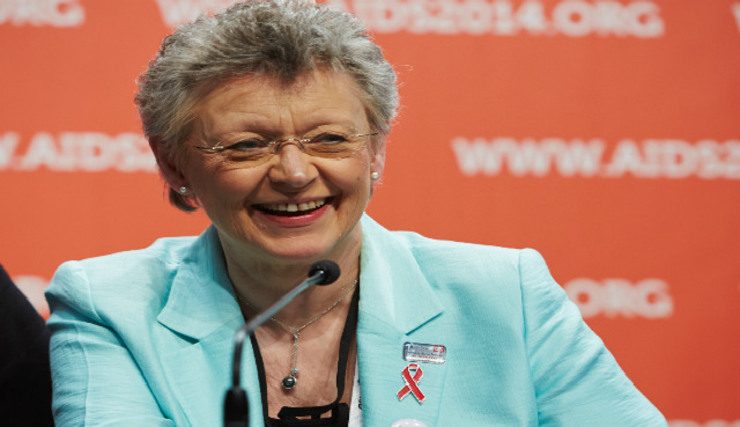SUMMARY
This is AI generated summarization, which may have errors. For context, always refer to the full article.
![]() MELBOURNE, Australia – An AIDS free generation is possible, but not without striking down laws that criminalize homosexuality and HIV transmission, and addressing treatment gaps that leave the most vulnerable populations at high risk for HIV.
MELBOURNE, Australia – An AIDS free generation is possible, but not without striking down laws that criminalize homosexuality and HIV transmission, and addressing treatment gaps that leave the most vulnerable populations at high risk for HIV.
“We all know that the unprecedented international mobilization against HIV/AIDS has fathered the concept of global health.” said Françoise Barré-Sinoussi, president of the International AIDS Society
Among the scientific and global health achievements that were announced during the conference was a 25% decline in HIV-related deaths and the 14 million patients – mostly from low to middle income countries – who now have access to life-saving anti-retroviral therapy (ART). By 2015, an additional 1 million people will be put on ART.
Since 2002, 10 million new HIV infections have been averted and 7 million deaths prevented.
New technologies in prevention and care included the on-going development of rectal microbicide creams (which could help prevent transmission of the HIV virus ) and administration of anti-retroviral medication through nano-films similar in appearance to Listerine strips that look like post-its.
“I remember 15 years ago some people were saying that universal access is just a dream. I guess this is the proof that when the world is mobilized toward one goal, then dreams can become a reality,” Barré-Sinoussi.
When he addressed the delegates on Wednesday, former president of the United States Bill Clinton said, “An AIDS-free world is just beyond the horizon.“
The United Nations set a target to “ending the epidemics of AIDS, tuberculosis and malaria by 2030.”
Underlying epidemics of hate and discrimination
However, a strong undercurrent throughout the conference was the increasing prevalence of laws that criminalize homosexuality and HIV transmission, sex work and drug use.
“Today, many of the victories (in HIV) are threatened. A wave of discriminatory laws and policies are setting us back – toward exclusion: limiting rights, reducing health care access, and aiding the virus,” said Chris Beyrer who will now take on the presidency of the IAS.

“Ï am a gay man. I live in Nigeria. That makes it very difficult for me”, said Ifeanyi Orazulike, who runs a clinic for gay men and transgender people in the Nigerian capital of Abuja. “We would see about 60 patients monthly, mostly men who have sex with men. Now, the number has dwindled down to 15.”
In Nigeria, gay sex is already illegal. Earlier this year, a law banning same – sex marriages, gay groups and shows of same-sex public affection was quietly signed into law.
New legislation, signed into law by the president without announcement, bans same-sex marriages, gay groups and shows of same-sex public affection.
During the conference, M-Coalition was officially launched as the first regional network formed to address the needs of men who have sex with men in the Middle East and in North America (MENA) region. Apart from the discriminatory laws in this area, the political instability in that area make it difficult for health workers to carry out and sustain HIV interventions.

Anal sex has been present in India, in our culture for more than 2,000 years. We did not have laws against them. It was the British who brought them in and then left them behind when they left,” said an Indian delegate and gay/transgender activist in India.
India struck down its sodomy laws in 2009; a decision which was overturned by the Supreme Court in 2013.
“We should all be deeply concerned about the anti-gay laws and policies being enacted in Russia, India, Nigeria, Uganda and now being openly debated in many more countries,” said Beyrer who added that these threaten to undermine the overall progress in the global HIV/ AIDS response.
Beyrer also called for the continued support for HIV research and advocacy saying that “we are at risk for the HIV pandemic falling off the global agenda before we are done. It would be an immense human tragedy to fail at this stage, but we might.“
Investment in HIV prevention research fell US$50 million (around 4%) to US$1.26 billion in 2013, due to declining investments by the United States and European government donors.
The US government is the single largest funder of prevention research, funding more than 70% of total investment over the past 5 years.
The International AIDS Conference (AIDS2014) in Melbourne officially ended Friday, July 25. – Rappler.com
Ana P. Santos is a regular contributor for Rappler apart for her DASH of SAS column, which is a spin off of her website, Sex and Sensibilities (SAS). In 2012, Ana was awarded a media grant to write about women who are most affected by the absence of an RH Law. Read the complete story on Rosalie Cabinyan and Laura Jane Duran here. Follow her on Twitter at @iamAnaSantos.
Rappler columnist Ana Santos is in Melbourne, Australia covering the AIDS Conference 2014. Check her other stories here:
Add a comment
How does this make you feel?
There are no comments yet. Add your comment to start the conversation.